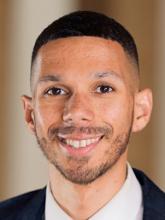Lakayana Drury is the executive director at Word Is Bond.
I consider myself a Black optimist. But perhaps I am not the unicorn I think I am. Perhaps all Black people are. You almost have to be to wake up each day and live your life as a Black person in the United States. Because every fiber of my conscious tells me the Constitution does not protect Black people. And as a former history teacher, I certainly know it was not written by or for people like me.
The Derek Chauvin trial was supposed to be America’s reckoning with police brutality. But then Adam Toledo happened. Then Duante Wright happened. And I, a Black optimist, wonder if things can or ever will change.
I know that if things are to change, white people and police agencies have to want them to change. I can do all the work possible through my role as executive director of a nonprofit that works to rewrite the narrative between young Black men and law enforcement. But unless police agencies are ready to do the soul work required to grapple with their legacy of violence, we will pass this problem on to the next generation and the one after that. Police agencies have to realize that, in the words of Dr. King, “their freedom is inextricably bound to our freedom.”
The problem is police agencies, not Black people. The suppression of Black communities through limited employment and education opportunities has created conditions that in some cases lead Black people to be more likely to have illegal firearms, join gangs or engage in certain crimes. This pretext has been used to overpolice, harass and brutalize our people for decades. What we need are the resources — economic, educational, housing and family support — to thrive. Instead of giving us empathetic social workers and teachers who can help raise our people up, our streets are saturated with armed individuals who don’t live in our neighborhoods and perceive our every action as a threat.
As a light-skinned Black man, who reached adulthood without any serious police encounters and attained a college degree, I am not as likely as some of the youth I serve to experience police violence. I work daily with police agencies, hoping to shed some light on how they can improve their practices, perhaps with more patience than they deserve. I work even more closely with our young Black men, of all backgrounds and ways of life, to help inspire them to find their gifts and impact the world. I have met many good police chiefs and officers in my work, but I do not sense the urgency from the law enforcement community as a whole to grapple with where we are at.
There comes a point where good people are no longer good enough. If the good officers can’t weed out the so-called “bad apples,” then the system has failed. If we cannot serve and protect all people and guarantee their life and liberty, then who really do we serve? This is where we are at. Police agencies have to want change as much, if not more, than Black people. White people must care about dismantling white supremacy as much as they care about raising their children. Racism is a public health crisis and must be redressed as such.
I believe we can do it. We have the resources and people power to live up to the principles that have escaped us for so long. We must be urgent, we must be fierce, and we must work together, hand in hand.
Mike Schmidt: Derek Chauvin is on trial, but ‘this journey toward equity hasn’t ended’


